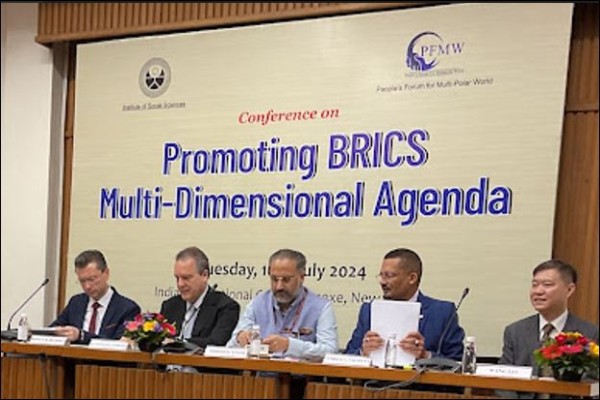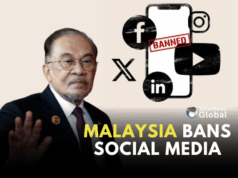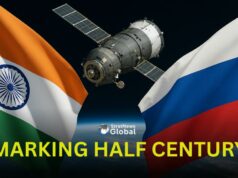“A couple of western countries cannot and should not monopolise world order, rule-making and global narrative,” believes Wang Lei, Minister, Embassy of China, New Delhi. “Power politics and law of the jungle have no place in our era.”
He was addressing a Conference on ‘Promoting BRICS Multi-Dimensional Agenda’ organised jointly by Institute of Social Sciences, New Delhi, and the People’s Forum for a Multipolar World, at the India International Centre which had top diplomats from Brazil, Russia, India, China and South Africa (the five BRICS founder states) as keynote speakers on July 15.
“The Ukraine crisis and Gaza conflict continue unabated, climate change and food security challenges are intertwined. World economic recovery faces headwinds,” he said. But on the other hand, “a new industrial and technology revolution is gathering speed. Emerging markets and developing countries face historic opportunities for leapfrog development.”
“On the Ukraine crisis, China is committed to peace and dialogue. We support an international peace conference to be held at a proper time that is recognized by both Russia and Ukraine,” said Wang. And “on the Palestinian question, we must push for an immediate, comprehensive and lasting ceasefire, ease humanitarian crisis, restart the two-State solution at an early date, and achieve lasting peace in the Middle East.”
Accusing the US of pursuing a “ zero-sum game and bloc confrontation,” seeking protectionism and decoupling in order to retain its hegemony, he said “these are self-defeating approaches and harm others too.”
”Seventy years ago, the Chinese leadership together with India and Myanmar advocated the Five Principles. They inspired and encouraged more and more countries in Asia, Africa and Latin America to support each other and embark on an independent path of development,” he said.
Insisting that “Development is not a privilege reserved for few western countries,” he urged the BRICS nations to “unite to build a better future together” based on those Five Principles.
Earlier, delivering the inaugural speech at the conference, Roman Babushkin, Charge d’Affaires at the embassy of Russia in New Delhi, underlined the importance of the BRICS format for resolving multilateral issues.
“Russia, being the BRICS Chairman, now pays great attention to the integration of new members of the association. Also on the agenda of the Russian presidency are issues of security in various fields, trade and economic cooperation, an increase in the use of national currencies in cross-country settlements, cooperation in the field of lawmaking and artificial intelligence,” he said.
An Indophile know for his fluent Hindi, Babushkin underscored his long association with Indian noting that this was his third posting in India, and “as far as I remember, I served here, in India, which has become my second home.”
Thanking the other four representatives of BRICS founder states present at the conference (Ambassador Kenneth H Da Nobrega of Brazil; Acting High commissioner of South Africa Cedric C Crowley, Joint Secretary, Ministry of External Affairs ,Abhishek Singh and Minister Wang from the Chinese Embassy in Delhi) , Babushkin said “Russia is very proud to be the BRICS chair at this critical juncture” when the grouping has expanded.
Egypt, Ethiopia, Iran, Saudi Arabia and the United Arab Emirates became members of BRICS on January 1 this year, making it a 10-member bloc. Argentina pulled out of its plans to join the grouping in December 2023 following the election of its right wing President Javier Milei, who during his campaign had described the Chinese government as assassins and pledged not to work with communists.
The formal grouping of emerging economies was initially conceived after the leaders of Brazil, Russia, India, and China countries met informally on the margins of the G8 Outreach Summit in St Petersburg, Russia, in July 2006. Their first summit was held in Russia in June 2009. South Africa, invited to join in 2010, attended the third BRICS summit in Sanya, China, in 2011.
Abhishek Singh, Joint Secretary (Multilateral Economic Relations and Economic Diplomacy) Ministry of External Affairs, who has served in Venezuela, Beijing, Kabul, New York, and Berlin, among other places, began by noting that the presence of senior representatives from the founding members of BRICS at the conference was in itself a sign of the importance of the grouping.
Thank Prof @Ashnarainroy for inviting me to address a Conference today on 'Promoting BRICS Multi-Dimensional Agenda' organised by Inst. of Social Sciences. Glad to meet diplomats from founding BRICS members . Spoke on various issues being discussed presently within BRICS. pic.twitter.com/lurHjBHNbP
— Abhishek Singh (@Abhishekifs) July 16, 2024
Noting that the Global landscape is undergoing a very complex transformation”, he said that BRICS rested on the pillars of cooperation: Politics and Security; Economy, Culture, Finance; and People to People Exchanges. This cooperation was based on the BRICS spirit of mutual respect and understanding, equality, solidarity, inclusiveness and consensus, and consensus was a critical part of “how we work.”
Noting that India has always been very staunch supporter of multilateralism, he said New Delhi, along with other likeminded nations, was working at various multilateral forums to create a “more representative, multilateral global governance architecture.” BRICS’ work on economic development, climate change, counter-terrorism and the reform of global decision-making processes, including the UN security council, was therefore of critical importance, he felt.
Kenneth Nobrega, the ambassador of Brazil in New Delhi, felt that the expansion of BRICS “bodes well for the group,” and offered it a chance to diversify and strengthen economic ties across different regions.
Also, “we have a very diverse multi-dimensional agenda within BRICS,” which was one of the strengths of the group, he added, because it further reinforced the consensus mentality. BRICS held more than a 100 meetings each year, at various levels, and this allowed domain experts to meet and resolve tricky issues which sometimes required “very dense technical knowledge.”
He also noted that some western nations spoke of “efficient” multilateralism, which Brazil felt went against “inclusive” multilateralism.
Cedric C Crowley, Acting High commissioner of South Africa, dwelt on his country’s foreign policy, which comprised three important pillars, one, south south cooperation, (“because we were recepients of this cooperation during our freedom struggle”); North South Dialogue, and the centrality of multilateralism.
Noting that the current global rules based order was made by the victors of World War II and thus skewed in their favour, he said South Africa believes “BRICS can play a very significant role in restructuring that order in favour of a more equitable and representative world.” However, he emphasised, BRICS was not meant to replace any global institutions, but to strengthen them.
He then went on note that while the west seemed to have ample money to spend on conflicts, when it came to funds pledged for climate change, there seemed to be a problem. BRICS could play a key role in addressing such challenges, he felt.
“BRICS presents a new constellation of power. It doesn’t see Global South and Global North as the two very agitated elephants ready to pounce on each other. Brics is a ‘cafe com leite’ (coffee with milk) alliance which is a harmonious blend of two different elements coming together to create something delightful,” Ash Narain Roy, Director of the Institute of Social Sciences, told StratNewsGlobal. “BRICS platforms and initiatives need not become a clone of Global North’s institutions, “ he added.
Ambassador Deepak Bhojwani, Distinguished visiting fellow, Ananta Centre, who spent 12 years of his career as a diplomat in Latin America, who chaired a subsequent working session of the conference, had a few words of caution.
After noting that despite changes in its structure, it still is a cogent grouping, he said expansion had certain issues, and this could lead to rising discrepancies and discord.
“I was told, on good authority, that not all the founder members were in favour of even the current enlargement,” he said. “And going forward, India for one, might not be in favour of an even larger expansion as of now. You need to get your act together first, because some of the challenges before BRICS sometimes could even outweigh the strengths it has brought to bear on the global table.”
In a career spanning three decades and counting, Ramananda (Ram to his friends) has been the foreign editor of The Telegraph, Outlook Magazine and the New Indian Express. He helped set up rediff.com’s editorial operations in San Jose and New York, helmed sify.com, and was the founder editor of India.com.
His work has featured in national and international publications like the Al Jazeera Centre for Studies, Global Times and Ashahi Shimbun. But his one constant over all these years, he says, has been the attempt to understand rising India’s place in the world.
He can rustle up a mean salad, his oil-less pepper chicken is to die for, and all it takes is some beer and rhythm and blues to rock his soul.
Talk to him about foreign and strategic affairs, media, South Asia, China, and of course India.





